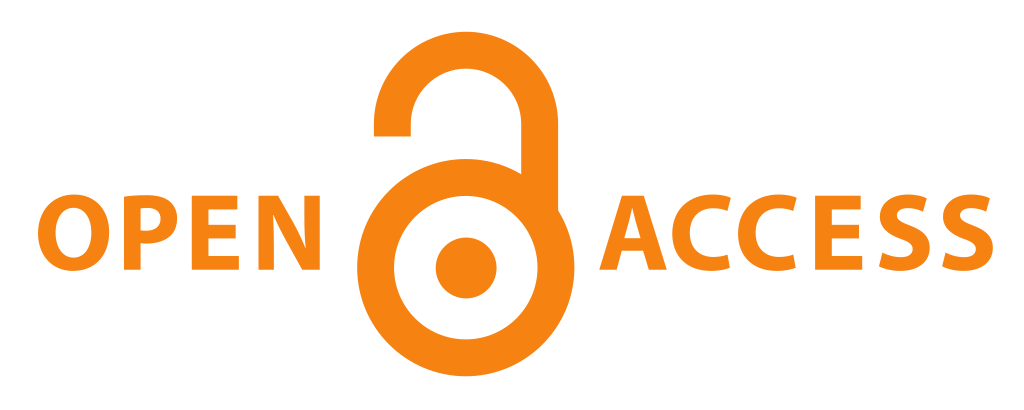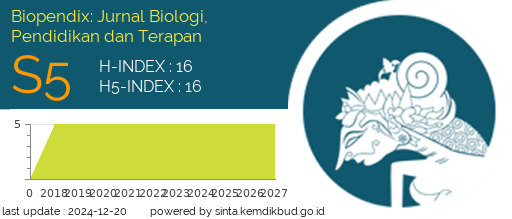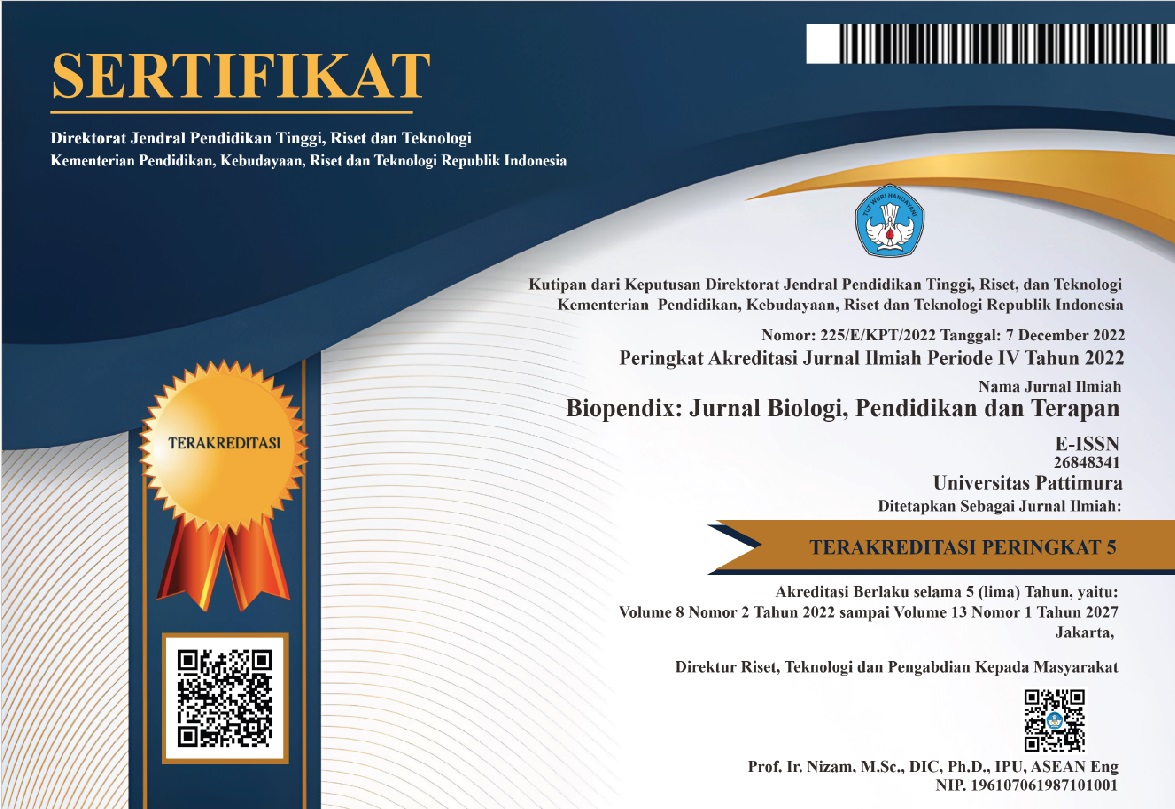MODEL PEMBELAJARAN INKUIRI TERBIMBING BERWAWASAN PENDIDIKAN KARAKTER UNTUK MENINGKATKAN HASIL BELAJAR SISWA SMP
Abstract
Background: Survey of researchers in SMP N 38 Semarang, it turns out there are still many teachers who use conventional learning methods and combinations of several methods have not involved students' cognitive, affective, and psychomotor aspects. Learning activities are still dominated by teachers. This resulted in students tend to be passive and the classroom atmosphere became teacher centered. To overcome this problem learning needs to be varied so that the learning process activates students more.
Method: The study was conducted through the development method (research and development) which consisted of three stages, namely introduction, development, and evaluation.
Results: Based on data analysis, cognitive learning outcomes reached 71.4% completeness with the results of the Gain Test of 0.71 (high gain category). Psychomotor learning outcomes achieved 74.60% achievement, achievement of affective learning outcomes was 73.39% while inquiry skills gained 71.52%.
Conclusion: Based on the achievement of learning outcomes, it can be concluded that the devices developed are considered effective. Positive responses of students to teaching materials were 86.40%, while the positive responses of students to LKS reached 87.46%. This means that learning devices developed can be applied in learning.
Downloads
References
Agboola Alex . 2012. The Bring Character Education into Classroom. European Journal of Educational Research Vol. 1, No. 2, 163-170
Bilgin, Ibrahim. 2009. †The Effects Of Guided Inquiry Instruction Incorporating A Cooperative Learning Approach On University Students’ Achievement Of Acid And Bases Concepts And Attitude Toward Guided Inquiry Instructionâ€. Academic Journal Journal Vol.4 (10), pp. 1038-1046
Dimyati dan Mudjiono. 1994. Belajar dan Mengajar. Jakarta: Rineka Cipta
Dostal, J. 2015. The Definition of the term “Inquiry Based Instructionâ€. International Journal of Instruction Vol. 8, No. 2: 69-82
Gormally Cara. 2009. Effects of Inquiry-based Learning on Students’ Science Literacy Skills and Confidence. International Journal for the Scholarship of Teaching and Learning Vol. 3 No. 2, Art. 16
Ifeoma E Olibie and Oge K Ezeoba. 2013. Effects of Guided Inquiry Method on Secondary School Students’ Performance in Social Studies Curriculum in Anambra State, Nigeria. British Journal of Education, Society &Behavioural Science 3(3): 206-222
Joyce, B., Weil, M. dan Calhoun, E. 1992. Models of Teaching. Fourth Edition. Boston: Allyn and Bacon
Kindsvatter, R., Wilen, W,dan Ishler, M. 1996. Dynamics of Effective Teaching Third Edition. Longman Publisher USA
Kinkoft Timothy and Casey Cort. 2016. Character Education: Teachers’ Perceptions of its Implementation in the Classroom. Delta Journal of Education Volume 6, Issue 1: 1 -16
Pattaro, C. (2016). Character Education: Themes and Researches. An academic Literature Review. Italian Journal of Sociology of Education, 8(1), 6-30
Peter, D. R. 2006. Teacher Perception of Different Models of Conducting A Physics Experiment. Malaysia: Seameo Recssam
Premier, B. 2004. Open-ended Experiment about Wind Energy. Jerman: Department of Physics and Astronomy
Rohman, Muhammad. 2012. Kurikulum Berkarakter. Jakarta: Prestasi Pustaka Publisher
Saedjijo and Alib Hapzi.2017. Integrating Character Building into Mathematics and Science Course in Elementary School. International Journal of Environmental and Science Education Vol. 12, No. 6, 1547-1552.
Slavin, Robert E. 2002. Cooperative Learning : Teori, Riset , dan Praktik. Bandung: Nusa Media
Suparno, P. 2007. Metodologi Pembelajaran Fisika. Yogyakarta: Universitas Sanata Dharma
Trianto. 2007. Model-model Pembelajaran Inovatif Berorientasi Konstruktivistik, Konsep, Landasan Teoritis-Praktis dan Implementasinya. Jakarta: Prestasi Pustaka Publisher
Trowbridge, L. W. dan Bybee, R. W. 1996. Becoming a Secondary School Science Teacher. Melbourne: Merril Publiching Company
Wenning. C, J. 2005a. â€The Levels of Inquiry Model of Science Teachingâ€. Journal of Physics Teacher Education Online. 2 (3): 3-11
Wilson J. Gonzalez-Espada & Michelle Stone. 2007. “Guiding Experiences in Physics Instruction for Undergraduatesâ€. Journal of Physics Teacher Education Online. 4 (3): 3-6
Wiyanto. 2008. Menyiapkan Guru Sains Mengembangkan Kompetensi Laboratorium. Semarang: Unnes Press
Zanchos, P. 2004. Pendulum Phenomena and the assesment of Scientific Inquiri Capabilities . Netherlands: Kluwer Academic Publishers
Zubaedi. 2011. Desain Pendidikan Karakter Konsepsi dan Aplikasinya dalam Lembaga Pendidikan. Jakarta: Prenada Media Group.
Authors who publish with this Journal agree to the following terms:
- Author retain copyright and grant the journal right of first publication with the work simultaneously licensed under a creative commons attribution license that allow others to share the work within an acknowledgement of the work’s authorship and initial publication of this journal.
- Authors are able to enter into separate, additional contractual arrangement for the non-exclusive distribution of the journal’s published version of the work (e.g. acknowledgement of its initial publication in this journal).
- Authors are permitted and encouraged to post their work online (e.g. in institutional repositories or on their websites) prior to and during the submission process, as it can lead to productive exchanges, as well as earlier and greater citation of published works





 2
2






